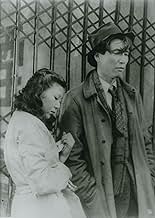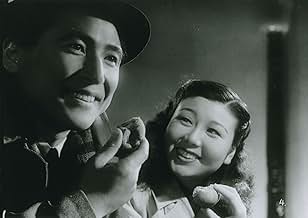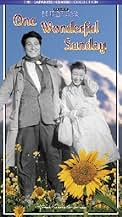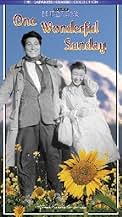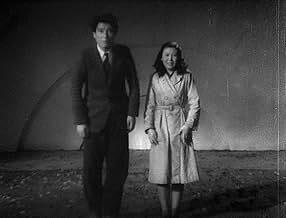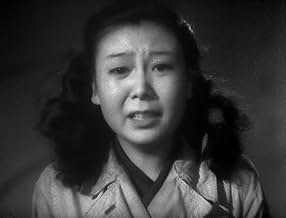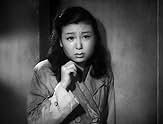NOTE IMDb
7,2/10
3,9 k
MA NOTE
Lors d'une sortie du dimanche dans Tokyo ravagé par la guerre, Yuzo qui a perdu tout espoir et Masoko encore optimiste cherchent du travail et un logement, ainsi que des divertissements abor... Tout lireLors d'une sortie du dimanche dans Tokyo ravagé par la guerre, Yuzo qui a perdu tout espoir et Masoko encore optimiste cherchent du travail et un logement, ainsi que des divertissements abordables pour passer le temps.Lors d'une sortie du dimanche dans Tokyo ravagé par la guerre, Yuzo qui a perdu tout espoir et Masoko encore optimiste cherchent du travail et un logement, ainsi que des divertissements abordables pour passer le temps.
- Réalisation
- Scénario
- Casting principal
- Récompenses
- 2 victoires au total
Sachio Sakai
- Shady Ticket Man
- (non crédité)
Avis à la une
I loved this film for all the reasons already advanced on this board. A story about two lovers who have only each other in a devastated, corrupted, and occupied society is universal in every sense.
I think Kurosawa's postwar films are especially interesting from a political point of view. All of his films had to pass U.S. censors, and so his political comments are shrouded in symbolism and cinematic sleight of hand. American occupation authorities doubtlessly viewed this film as a simple tale of struggling lovers. But a closer look reveals much more.
"Yuzo" is a war veteran down on his luck. Millions of Japanese war veterans returned home to a society ashamed of their service and anxious to forget their failure. "Masako" is his lover but their future together is rendered difficult by their mutual poverty.
Kurosawa gives us glimpses of pathetic war orphans, destitute women forced into prostitution, and a new economic oligarchy made wealthy by black markets. The ruins of Tokyo are presented only on distant horizons or as incidental background, but the damage inflicted by the 20th U.S. Air Force is clearly implied. None of these elements would ever pass U.S. censorship had they been essential to the story.
Postwar Japanese audiences. however, doubtlessly recognized these subtle references to their occupied and devastated country. That Kurosawa could express these matters without provoking American censorship is itself a testament to his artistic skills.
I think Kurosawa's postwar films are especially interesting from a political point of view. All of his films had to pass U.S. censors, and so his political comments are shrouded in symbolism and cinematic sleight of hand. American occupation authorities doubtlessly viewed this film as a simple tale of struggling lovers. But a closer look reveals much more.
"Yuzo" is a war veteran down on his luck. Millions of Japanese war veterans returned home to a society ashamed of their service and anxious to forget their failure. "Masako" is his lover but their future together is rendered difficult by their mutual poverty.
Kurosawa gives us glimpses of pathetic war orphans, destitute women forced into prostitution, and a new economic oligarchy made wealthy by black markets. The ruins of Tokyo are presented only on distant horizons or as incidental background, but the damage inflicted by the 20th U.S. Air Force is clearly implied. None of these elements would ever pass U.S. censorship had they been essential to the story.
Postwar Japanese audiences. however, doubtlessly recognized these subtle references to their occupied and devastated country. That Kurosawa could express these matters without provoking American censorship is itself a testament to his artistic skills.
With this warm and uplifting film, the effect Kurosawa achieves is in the simplicity. The story is threadbare. Two lovebirds try to spend a Sunday together in post-war Tokyo and enjoy themselves with only 35 yen in their pockets. Kurosawa never ceases to amaze me because of his incredibly acute comprehension of the visual effects of a story. The simpler the story is, the more it becomes simply a day in their lives. The more it becomes a day in the life, the more upsetting we find the challenges facing them because of the Occupation and the crumbling economy at the time.
It's almost like a lightweight version of The Lost Weekend. There are no debilitating problems like alcoholism or writer's block. There are just obstructions and inconveniences with which the characters can either roll or stew around.
One Wonderful Sunday is a beautiful slice of life from a time that could be many different times in many different places. It's a peaceful movie about the peace that is always there for a given person, their journey being to find it. I have rarely seen a sequence so beautifully crafted on film as the two lovers in the empty, decaying concrete exterior auditorium, where one resolves to create the music they have been struggling to hear. There is hardly a handful of filmmakers living today that would think of such a thing. Kurosawa may have had the clearest, purest understanding of cinema out of any filmmaker.
It's almost like a lightweight version of The Lost Weekend. There are no debilitating problems like alcoholism or writer's block. There are just obstructions and inconveniences with which the characters can either roll or stew around.
One Wonderful Sunday is a beautiful slice of life from a time that could be many different times in many different places. It's a peaceful movie about the peace that is always there for a given person, their journey being to find it. I have rarely seen a sequence so beautifully crafted on film as the two lovers in the empty, decaying concrete exterior auditorium, where one resolves to create the music they have been struggling to hear. There is hardly a handful of filmmakers living today that would think of such a thing. Kurosawa may have had the clearest, purest understanding of cinema out of any filmmaker.
I had said two weeks ago, in a review of Scandal, that Eclipse's new Kurosawa box set could just as easily be called Lesser Kurosawa. That's not fair. I know there are those who champion The Idiot and No Regrets for Our Youth, and even the one film I had previously seen from the set, I Live in Fear, is quite good (though it's hard to argue with it being a lesser film is such an outstanding oeuvre). The truth was, I was hoping very much to find some lesser-known Kurosawa classics. Which brings us to One Wonderful Sunday. Judging solely by IMDb's votes, it's Kurosawa's third least seen movie. And it ranks #26 out of 30 when listed by ratings. Well, I'll be happy to act like I was the first who discovered this hidden gem in Kurosawa's catalogue. This really is a wonderful little film. Influenced very much by Vittorio de Sica, one of Kurosawa's favorite directors, One Wonderful Sunday follows two young lovers, Yuzo and Masako (Isao Numasaki and Chieko Nakakita), spending the titular day together with nothing but ¥35 between them. The two experience sadness and hardship as they go about their date. The structure is episodic, as the lovers experience odd vignettes, meeting various post-war types, like bums and orphans and ticket scalpers. The two try to be happy with each other's company, but Yuzo's poverty makes him feel like less of a man. In one of the strongest sequences in Kurosawa's career, Yuzo decides to act like a cad to drive Masako away. Kurosawa was hardly ever the subtle type, and he is not known for long periods of silence or long takes. This sequence demonstrates a different side of the director. The climax of the film involves an odd breaking of the fourth wall resembling the device in J.M. Barrie's Peter Pan. As far as I know, this is the only time Kurosawa ever attempted such a thing. That wouldn't be too surprising, though, as film audiences rarely interact with characters on screen. It's just too out there for the medium. But God bless Kurosawa for trying it. It's kind of schmaltzy, but I loved the characters so much that at least I thought about clapping for them. A forgotten near-masterpiece.
Not one of my favourites from Akira Kurosawa- hard because he is one of cinema's greatest directors with a lot of great films- but when talking about his most underrated films One Wonderful Sunday would be a strong contender. A few scenes go on for a little too long, other than that there was not really anything that came across as wrong. Admittedly the ending is an odd one but also amusing and affecting, one of those endings that wasn't a problem for me but one also that will work for some and not so much for others. While not the most audacious visually of Kurosawa's films One Wonderful Sunday is still beautifully shot, going for the simple (but not simplistic) approach rather than one that, considering the tone of the film, could fall into overblown-style territory. Kurosawa's direction for so early on in his career directs more than capably, One Wonderful Sunday is different in a way for him- one of his most simple films for sure- but there is clear evidence of knowing how to direct with style and he seems to be very comfortable with it. The music when used fits very well and will please any listener. The writing is amusing and uplifting while also peaceful and poignant, and with the story there is a playful tone in places, a dream-like one in others and then there are a lot of scenes where it is endearingly sweet and has a lot of emotional impact. There is poverty as a theme but it's not used heavy-handedly at all. The acting is very good if not among the greatest performances of a Kurosawa film. Then again, you shouldn't expect that, and that is the same with the film too, even if it isn't one of Kurosawa's finest it does deserve to be judged on its own merits of which One Wonderful Sunday has a great many. Coming back to the acting, Chieko Nakakita is captivating right from her appearance to how she grabs the attention of the viewer even in the simplest of things. Overall, a beautiful film and deserves to be better known and seen much more than it is at the moment. 9/10 Bethany Cox
Akira Kurosawa's movies have a whole range of themes, be they set in contemporary or in historical eras. To name a few: the chasm between the rich and the poor, between the strong and the weak, between the courageous and the cowards, between the powerful and their foot folk, between the honest and the deceitful, between the clever and the idiots, between the sincere and the dishonest, and also, importantly, between war (destruction and loss) and peace (happiness).
In this movie, made just after WW II, he depicts the struggle for life of 'poor lovers', whose dreams were shattered by the war. Japan is in dire straits: no jobs, and, if you have a job, bad salaries; high rents for decent shelters and huge inflation. 'Free markets' are controlled by 'black' merchants and their thugs. There is still an upper class, which looks with contempt on those without money, their former foot folk. The girl remains optimistic, but her lover is deeply depressed.
Akira Kurosawa made some very risky shots on the music of F. Schubert's unfinished symphony. But, he had the mastery to create the perfect mood. Not to be missed and certainly not by A. Kurosawa fans.
In this movie, made just after WW II, he depicts the struggle for life of 'poor lovers', whose dreams were shattered by the war. Japan is in dire straits: no jobs, and, if you have a job, bad salaries; high rents for decent shelters and huge inflation. 'Free markets' are controlled by 'black' merchants and their thugs. There is still an upper class, which looks with contempt on those without money, their former foot folk. The girl remains optimistic, but her lover is deeply depressed.
Akira Kurosawa made some very risky shots on the music of F. Schubert's unfinished symphony. But, he had the mastery to create the perfect mood. Not to be missed and certainly not by A. Kurosawa fans.
Le saviez-vous
- AnecdotesThe film's climax was considered a failure in both Japan and the U.S. as audiences refused to clap for the lead characters, though supposedly it went over very well in France, gaining much audience participation.
- GaffesA clock is seen above a shop in the baseball scene. The time showing is 5:05, but it is still only morning.
- Bandes originalesLa Cumparsita
Composed by Gerardo Matos Rodríguez
Meilleurs choix
Connectez-vous pour évaluer et suivre la liste de favoris afin de recevoir des recommandations personnalisées
- How long is One Wonderful Sunday?Alimenté par Alexa
Détails
- Date de sortie
- Pays d’origine
- Langue
- Aussi connu sous le nom de
- One Wonderful Sunday
- Lieux de tournage
- Toho Studios, Tokyo, Japon(Studio)
- Société de production
- Voir plus de crédits d'entreprise sur IMDbPro
- Durée1 heure 48 minutes
- Couleur
- Mixage
- Rapport de forme
- 1.37 : 1
Contribuer à cette page
Suggérer une modification ou ajouter du contenu manquant

Lacune principale
By what name was Un merveilleux dimanche (1947) officially released in India in English?
Répondre
